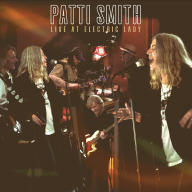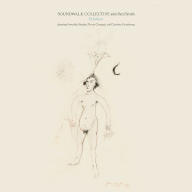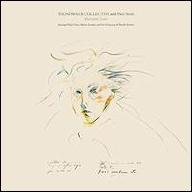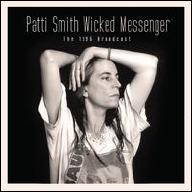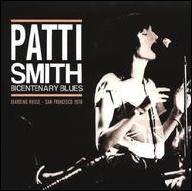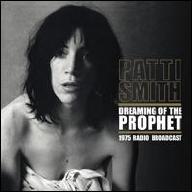Smith was born in Chicago on December 30, 1946. Her parents moved to Philadelphia when she was three, and then to the nearby, less urban town of Woodbury, New Jersey, when she was nine. Something of an outcast in high school, she found salvation in the poetry of Arthur Rimbaud, the writings of the Beat poets, and the music of soul and rock artists like James Brown, the Rolling Stones, the Doors, and especially Bob Dylan. She attended Glassboro State Teachers College, but dropped out due to an unplanned pregnancy. She gave the baby up for adoption and took a job on a factory assembly line, thus saving enough money to move to New York City in 1967. She worked in a bookstore and met art student/future photographer Robert Mapplethorpe, who became her lover despite living most of his adult life as a gay man. In 1969, Smith went to Paris with her sister, busking on the streets as a performance artist. Upon her return, she moved into the Chelsea Hotel with Mapplethorpe for a brief period, then became involved with underground theater.
With playwright and partner Sam Shepard, she co-authored and co-starred with him in the somewhat autobiographical play Cowboy Mouth in 1971. During this time, she was also working on her poetry as a member of the St. Mark's Poetry Project, and met guitarist Lenny Kaye, also a Bleecker Street record store clerk and rock critic. Kaye had written a magazine essay on doo wop that impressed Smith, and the two found that they shared a love of early and obscure rock & roll. When Smith gave a public poetry reading at St. Mark's Church in February 1971, she invited Kaye to accompany her on the electric guitar for three pieces. Over the next two years, Smith continued to perform in plays and poetry readings; she also wrote for Rolling Stone and Creem, published two volumes of her poems, and contributed lyrics to the literary-minded metal band Blue Öyster Cult.
Smith and Kaye performed again in late 1973, and their partnership grew into a much more regular occurrence. The following year, they added pianist/keyboardist Richard Sohl, and their performances grew into unique blends of Beat-influenced poetry, improvised spoken word with equally spontaneous musical backing, and covers of rock & roll oldies. Regular gigs around New York cemented their growing reputation, and in June 1974, with Mapplethorpe paying for studio time, the band cut a groundbreaking independent single, "Hey Joe" b/w "Piss Factory." The former added a monologue about Patty Hearst, while the latter recounted Smith's stint as an assembly line worker in vivid detail, incorporating lyrical snippets from the rock records in which she took solace. Both songs featured Television guitarist Tom Verlaine, and along with Television's own "Little Johnny Jewel," the single helped kick-start the independent, D.I.Y. aesthetic that remains punk rock's hallmark.
In late 1974, Smith and her band played a few gigs on the West Coast. When they returned, they added guitarist/bassist Ivan Kral to flesh out their sound, and joined Television as part of the emerging new rock scene at CBGB's, a dive bar in the Bowery. Their two-month stand in early 1975 sometimes featured drummer Jay Dee Daugherty, who became a regular member, and attracted the notice of Arista Records president Clive Davis, who offered Smith a record deal. She entered the studio with ex-Velvet Underground member John Cale serving as producer, and in late 1975 released her debut album, Horses, which was essentially the first art-punk album. Rapturously received by most critics, Horses offered unorthodox covers of party rock tunes like "Gloria" and "Land of 1000 Dances" (Smith opened the former with the declaration "Jesus died for someone's sins, but not mine"), as well as a mix of original songs and lengthy, improv-driven spoken word pieces; it sold well enough to climb into the Top 50.
The 1976 follow-up, Radio Ethiopia, was credited to the Patti Smith Group, and placed some of Smith's most straightforward rock songs ("Ask the Angels," "Pumping [My Heart]") directly alongside some of her most experimental, free-form pieces (the title track). In early 1977, Smith was performing in Tampa, Florida, when she twirled herself right off the stage; she broke two vertebrae in her neck and was forced to take some time off to recuperate. During that period, she wrote a book of poetry titled Babel. She returned to recording in 1978 with Easter, a more accessible nod in the direction of album rock radio, which featured her writing collaboration with Bruce Springsteen, "Because the Night." The ballad climbed to number 13 on the pop charts and sent Easter into the Top 20.
Smith's sound became increasingly polished on 1979's Wave, thanks in part to new producer Todd Rundgren. Two of the album's tracks, "Dancing Barefoot" and "Frederick," were dedicated to MC5/Sonic's Rendezvous Band guitarist Fred Sonic Smith, and the couple married in 1980. She retired to a life of domesticity near Detroit, raising two children with her husband. In 1988, Smith re-emerged with Dream of Life, on which Fred co-wrote all the material and also played guitar, with backing by Smith Group members Sohl and Daugherty. Following its release, Smith disappeared from music again but continued to write, completing a poetry collection called Woolgathering (among other projects), and gave occasional readings.
As the '80s became the '90s, Smith lost some of those closest to her. Longtime friend and album-cover photographer Mapplethorpe died in 1989, followed a year later by pianist Richard Sohl. At the end of 1994, both her husband and her brother Todd died of heart failure within a month of one another. Smith returned to performing as a means of therapy, and re-formed the Patti Smith Group -- with Kaye, Daugherty, and new bassist Tony Shanahan -- for a few small-scale tours including a December 1995 excursion with Bob Dylan that R.E.M.'s Michael Stipe documented in the book Two Times Intro.
The following year, Smith moved back to New York. She and the group then headed into the studio to record Gone Again, which featured a new second guitarist in Oliver Ray and guest spots from Tom Verlaine, John Cale, and Jeff Buckley. Gone Again took a stronger, more optimistic tone than might have been expected, and was well-received by many critics. That year, Smith also appeared on "E-Bow the Letter" from R.E.M.'s New Adventures in Hi-Fi, and published The Coral Sea, a book of poetry inspired by Mapplethorpe. Following closely on Gone Again's heels, Peace and Noise appeared in 1997 and earned a Grammy nomination for the track "1959"; a much darker affair than its predecessor, it took into account the deaths of two more of Smith's inspirations, Allen Ginsberg and William S. Burroughs. Smith returned in 2000 with Gung Ho, the most aggressive-sounding and socially conscious album of her comeback; the song "Glitter in Their Eyes" earned her a second Grammy nomination.
Smith and Arista parted ways in 2002, with the label issuing Land (1975-2002), a double-disc compilation of hits and rarities, as a wrap-up. Her first album for Columbia, Trampin', appeared in 2004 and included songs about the loss of her mother. The following year, Smith celebrated the 30th anniversary of Horses' release with the first live performance of the album in its entirety at London's Meltdown Festival, which she curated. Arista also reissued the album in a deluxe two-CD 30th Anniversary Legacy Edition. Also in 2005, the French Ministry of Culture named Smith a Commander of the Ordre des Arts et des Lettres. The following year, she performed at CBGB's final concert. On March 12, 2007, Smith was inducted into the Rock & Roll Hall of Fame alongside Van Halen, the Ronettes, Grandmaster Flash the Furious Five, and R.E.M. She released an album of typically eclectic covers, Twelve, that same year. In 2008, she issued The Coral Sea as a live album pairing readings from the book with music by Kevin Shields, and was the subject of Stephen Sebring's acclaimed documentary Patti Smith: Dream of Life.
Smith's creative streak continued during the 2010s. Her 2010 memoir about her life with Mapplethorpe, Just Kids,
won the National Book Award for Non-Fiction for that year. In 2011, Sony Legacy released a single-disc, career-spanning compilation, Outside Society, featuring recordings from her Arista and Columbia catalogs. Just after the recording was released, Smith, along with the Kronos Quartet, won Sweden's prestigious Polar Prize for "devoting her life to art in all its forms." Smith also contributed both a 12" x 12" original print and an audio track to the ultra-limited-edition, multi-artist Legacy box set 15 Minutes: Homage to Andy Warhol. That year, she also exhibited her first collection of photography, Camera Solo, at the Wadsworth Atheneum Museum of Art, and contributed songs to the Buddy Holly tribute Rave on Buddy Holly and the soundtrack to The Hunger Games: Catching Fire. Smith released Banga, her 11th studio album, in 2012. Along with her regular band, guests included her two children, Jackson and Jessi, Tom Verlaine, and Jack Petruzzelli. After meeting Stephen Crasneanscki of Soundwalk Collective in Paris, she became a frequent collaborator with the field-recording, globe-trotting group. Their first collaboration was Killer Road, an homage to Nico that chronicled her final days in Ibiza. Featuring the sounds of the island as well as poetry and vocals by Smith and her daughter Jesse, Killer Road was staged in New York City and Berlin in 2014 and released as an album that combined live and studio recordings two years later.
In 2015, Smith, her children, and her band recorded "Aqua Teen Dream" for the series finale of the Adult Swim cartoon Aqua Teen Hunger Force, one of her favorite shows. Among her other projects, Smith appeared in Terrence Malick's 2017 documentary Song to Song, while the concert/documentary film Horses: Patti Smith and Her Band appeared in 2018. The following year, she reunited with Soundwalk Collective for The Perfect Vision, a trilogy of albums about French poets. First up was that May's The Peyote Dance, a work inspired by Antonin Artaud's time with the Rarámuri, an indigenous people of Mexico's Sierra Tarahumara region. That November's Mummer Love also featured Philip Glass and Mulatu Astatke as it explored Arthur Rimbaud's spiritual journey to Harar, Ethiopia. The final volume of the project, September 2020's Peradam, was inspired by the metaphysical voyage in René Daumal's novel Mount Analogue. Along with Smith's poems and vocalizations, it included contributions from Charlotte Gainsbourg, Tenzin Choegyal, and Anoushka Shankar, as well as field recordings captured in the Himalayas and the Indian cities of Rishikesh and Varanasi. ~ Steve Huey, Rovi



